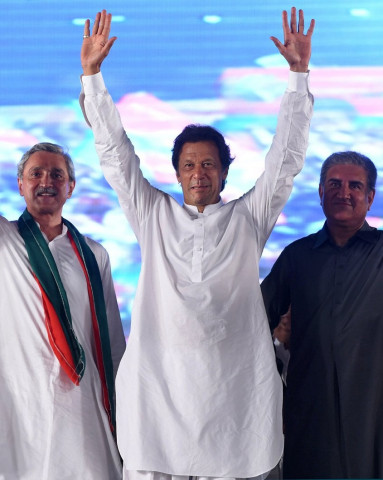PTI’s lopsided anti-corruption drive
Corruption by low-ranking officials who are underpaid and overwhelmed by responsibilities, is understandable

PHOTO: AFP
Measuring corruption is not easy, let alone preventing it. While there are no accurate estimations of this problem within our country, international entities like the anti-corruption NGO, Transparency International (TI), have been using a corruption perceptions index and corruption barometer surveys to track this global problem since the mid-1990s. In 1996, TI rated Pakistan as the second most corrupt country out of the 54 it surveyed. The corruption situation has improved but it has still not been overcome, given Pakistan ranked as the 117th least corrupt nation out of 175, in 2018.
While it may be argued the new government has been in power for only a year, and corruption will decrease in the coming years, the way in which the current accountability drive is being conducted remains problematic.
A perusal of past annual TI reports shows corruption was at its peak in Pakistan during the Benazir Bhutto government in 1996 and then during 2004-2005 under General Musharraf. From 2013 till 2018, Pakistan continued to improve its CPI score in a manner that each subsequent year corruption declined, even if modestly. The best CPI score was attained in 2018, the year of the shared rule of the outgoing PML-N government, caretaker regime, and PTI government.
Although the PPP regime under Zardari is generally dubbed the most corrupt in Pakistan’s history, the TI estimated that the last PPP tenure’s lowest score is three points better than the Musharraf government’s lowest score.
President Musharraf had created the National Accountability Bureau (NAB), which in its first three years of operation, convicted a veritable list of Pakistani politicians. But then the first director-general of NAB was removed for wanting to investigate alleged corruption in the military. Furthermore, Musharraf’s anti-corruption drive became increasingly diluted given his bid to consolidate power, by allowing discredited politicians to pay token fines in lieu of supporting his government. The infamous reconciliation ordinance issued in 2007 gave not only leading politicians, but many rich bureaucrats immunity from persecution for corruption committed between 1986 and 1999.
Despite these irregularities, the current PTI government’s probe has avoided focusing on corruption in Musharraf’s era and focused on the PPP and PML-N governments, a fact that the TI has now noted.
What then is the difference between the vindictiveness of politicians against opponents in earlier eras and the anti-corruption drive of the current PTI government? Despite having rallied against Musharraf’s government, the PTI government seems reluctant to probe the actions of political heavyweights who were part of it, especially those who have now joined PTI ranks.
The PTI remains hesitant to probe corruption within the so-called “deep state”. It has not been able to stop giving discretionary funds to MNAs and MPAs, despite the tensions it creates between local governments and public representatives whose job is to legislate rather than dole out funds to their constituents.
Corruption by low-ranking officials — whether a policeman or a patwari — who are underpaid and overwhelmed by responsibilities, is understandable. The endemic corruption by the powerful, who use their power to acquire more wealth and affluence and preserve the distorted status quo of societal inequities is harder to justify.
It would not be unfair to claim the present government lacks the required political will to enforce long-lasting measures for rooting out corruption from our midst.
Published in The Express Tribune, September 13th, 2019.
Like Opinion & Editorial on Facebook, follow @ETOpEd on Twitter to receive all updates on all our daily pieces.














COMMENTS
Comments are moderated and generally will be posted if they are on-topic and not abusive.
For more information, please see our Comments FAQ